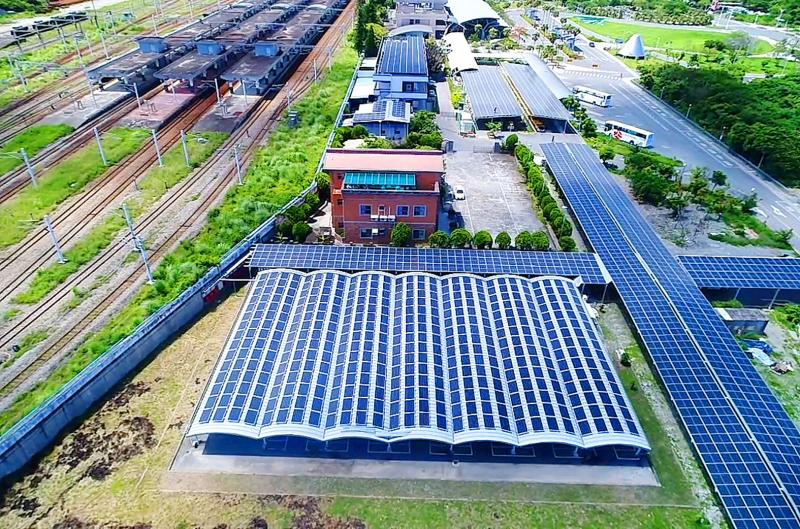Taitung Railway Station has become the nation’s first railway station that can generate additional revenue by producing solar energy, the Taiwan Railways Administration (TRA) said yesterday.
The agency said it had installed solar panels on the roofs of 12 buildings within the parameters of the Taitung Railway Station in accordance with the government’s policy to develop green energy, conserve electricity and reach net zero carbon emissions by 2050.
Taitung has the unique advantage of developing solar energy as it has sufficient and unimpeded sunlight, the TRA said.

Photo provided by the Taiwan Railways Administration
In addition to roofs, solar power panels have been installed on shades over sidewalks, parking lots and taxi stops, it said.
The total area covered by solar panels at the station is 8,652m2, with a power-generating capacity of 1.51 megawatts, it said.
The production of green energy helped reduce carbon emissions by about 820,517kg per year, which is equivalent to the amount of carbon dioxide that can be absorbed by two Daan Forest Parks in Taipei, the TRA said.
It can generate an annual revenue of NT$870,000 per year by selling the green energy to the Taiwan Power Co, it added.
Taxi drivers and passengers accessing the train station benefit from solar panel-covered shades that shield them from rain or sunlight, it said.
The success of the Taitung Railway Station in producing solar energy has motivated the agency to install solar panels in other railway stations around the country, it said.

A preclearance service to facilitate entry for people traveling to select airports in Japan would be available from Thursday next week to Feb. 25 at Taiwan Taoyuan International Airport, Taoyuan International Airport Corp (TIAC) said on Tuesday. The service was first made available to Taiwanese travelers throughout the winter vacation of 2024 and during the Lunar New Year holiday. In addition to flights to the Japanese cities of Hakodate, Asahikawa, Akita, Sendai, Niigata, Okayama, Takamatsu, Kumamoto and Kagoshima, the service would be available to travelers to Kobe and Oita. The service can be accessed by passengers of 15 flight routes operated by

MORE FALL: An investigation into one of Xi’s key cronies, part of a broader ‘anti-corruption’ drive, indicates that he might have a deep distrust in the military, an expert said China’s latest military purge underscores systemic risks in its shift from collective leadership to sole rule under Chinese President Xi Jinping (習近平), and could disrupt its chain of command and military capabilities, a national security official said yesterday. If decisionmaking within the Chinese Communist Party has become “irrational” under one-man rule, the Taiwan Strait and the regional situation must be approached with extreme caution, given unforeseen risks, they added. The anonymous official made the remarks as China’s Central Military Commission Vice Chairman Zhang Youxia (張又俠) and Joint Staff Department Chief of Staff Liu Zhenli (劉振立) were reportedly being investigated for suspected “serious

Taiwanese and US defense groups are collaborating to introduce deployable, semi-autonomous manufacturing systems for drones and components in a boost to the nation’s supply chain resilience. Taiwan’s G-Tech Optroelectronics Corp subsidiary GTOC and the US’ Aerkomm Inc on Friday announced an agreement with fellow US-based Firestorm Lab to adopt the latter’s xCell, a technology featuring 3D printers fitted in 6.1m container units. The systems enable aerial platforms and parts to be produced in high volumes from dispersed nodes capable of rapid redeployment, to minimize the risk of enemy strikes and to meet field requirements, they said. Firestorm chief technology officer Ian Muceus said

Alain Robert, known as the "French Spider-Man," praised Alex Honnold as exceptionally well-prepared after the US climber completed a free solo ascent of Taipei 101 yesterday. Robert said Honnold's ascent of the 508m-tall skyscraper in just more than one-and-a-half hours without using safety ropes or equipment was a remarkable achievement. "This is my life," he said in an interview conducted in French, adding that he liked the feeling of being "on the edge of danger." The 63-year-old Frenchman climbed Taipei 101 using ropes in December 2004, taking about four hours to reach the top. On a one-to-10 scale of difficulty, Robert said Taipei 101